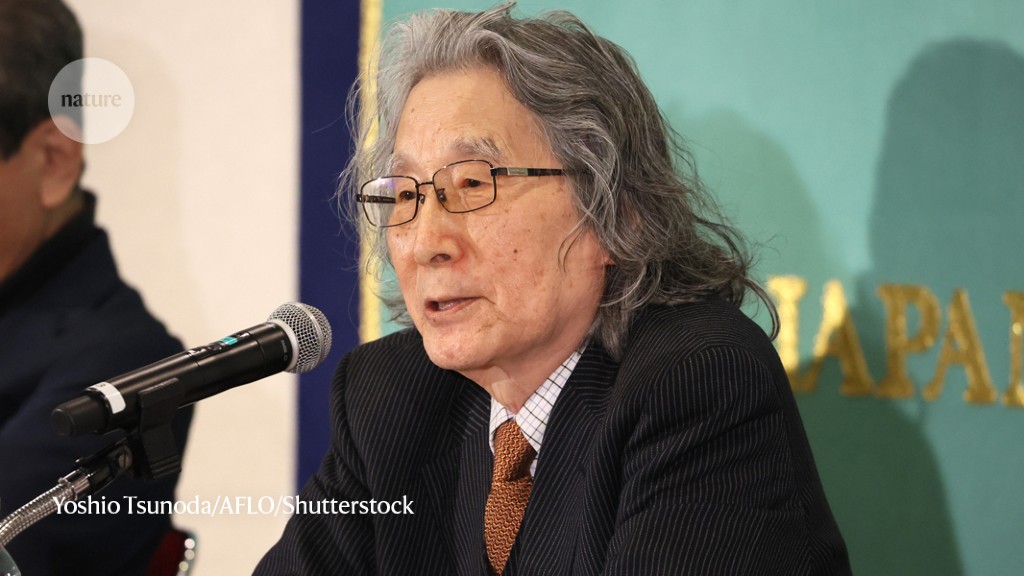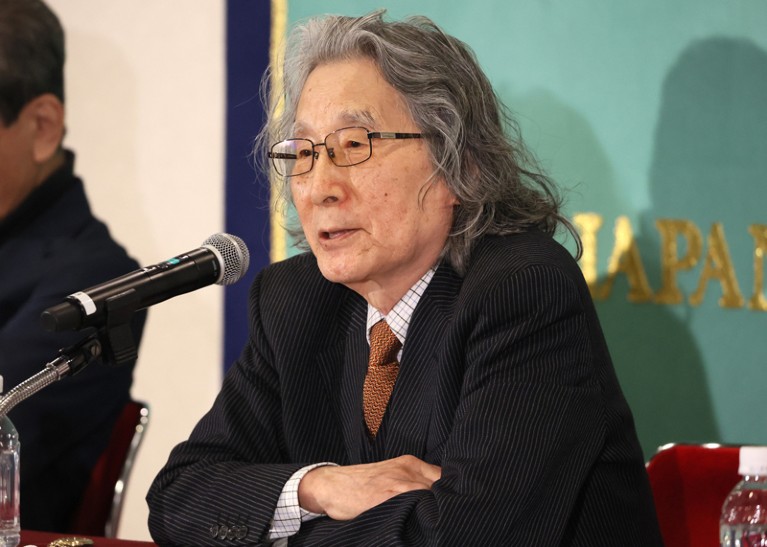Seigo Hirowatari speaking at the Japan National Press Club in February in support of the Science Council of Japan.Credit: Yoshio Tsunoda/AFLO/Shutterstock
Ructions between Japan’s government and the country’s influential science council (SCJ) are causing concern among researchers. The government backed away from its plans to reform the council’s constitution and its process for appointing members, after the council and many Japanese researchers objected to them. But the government is now drawing fresh ire with a proposal to privatize the body.
Observers predict that the council will ultimately be forced to forge a new relationship with the government: “I think the SCJ will have to find a way of existing as an organ within the government, while being independent,” says Hiroshi Nagano, a science and technology policy researcher at the National Graduate Institute for Policy Studies in Tokyo.
The 210-member SCJ advises the government on science and technology policy. It has assisted, for example, in drafting national guidelines on genome editing in human embryos. It also undertakes science-promotion activities, such as organizing symposia with schoolchildren.
Tensions first emerged in 2020, when then prime minister Yoshihide Suga rejected 6 of the 105 candidates nominated by the SCJ. In the past, members have made recommendations to the government for new appointments to the council, with the government’s approval being seen as a a formality. The SCJ renews half of its membership every three years.
The government did not explain why the candidates were rejected. However, some of them had criticized the policies of Suga’s predecessor, Shinzo Abe, including his drive to amend the country’s 1947 constitution to allow the possibility of war and to curb academic freedom. Some researchers therefore viewed the rejections as interfering with the council’s independence.
In December 2022, the government, led by Suga’s successor Fumio Kishida, proposed a reform bill that would require the SCJ to consult with a government body before making nomination recommendations. But the proposal drew vigorous protests from scientists and research bodies in Japan.
“This amendment may damage the independence of the Science Council of Japan,” wrote seven Japanese Nobel laureates and one Fields Medal winner in a statement released in February. “We earnestly hope that the government will reconsider its hasty amendment of the law.”
Former heads of the SCJ took the unusual step of holding a press conference to protest the government’s plan.
In April, minister for economic revitalization Shigeyuki Goto said that the government would shelve the bill, citing the danger of creating “a critical rift with the council”.
Yuko Harayama, an associate SCJ member and co-chair of the Japanese Association for the Advancement of Science, says it became an issue of trust. “I think the decision to postpone this proposal is the right signal that the government and council are moving in the direction of rebuilding trust.”
“It’s really easy to trigger mistrust and it takes a long time to re-establish that trust,” she says.
Public corporation
But the government has not abandoned plans to overhaul the council. The SCJ is currently a “special organization” under the jurisdiction of the prime minister and regulated by itself. When the government shelved the bill, it said it would consider turning the council into a a specially designated public corporation, allowing it autonomy and flexibility, but still under the supervision of the government.
Yasuaki Kodama, an adviser to the cabinet secretariat, says that the public-corporation proposal “is just being considered for discussion”. Although he gave no timeline for discussions, he pointed out there are dozens of specially designated public corporations, including the public-broadcaster NHK and the Japan Pension Service. Kodama says that such a status would fulfil the SCJ’s desire for independence and state financing, and would be in line with science bodies in other G7 countries.
However, SCJ members remain nervous about the implications of such a change. “We will not limit ourselves to the issue of whether the Science Council of Japan should remain a government organization,” SCJ president Takaaki Kajita said in a statement in late April. He said that the discussions about the future of the SCJ should be expanded “to take sufficient time to consider what is truly required for the development of Japanese academia”
Seigo Hirowatari, a law researcher at Senshu University in Tokyo, who led the council in 2011 suspects that the push to reform the SCJ is bound up with the government’s changing stance towards research with military applications, although Kodama denies that is the case.
Hirowatari says that the SCJ’s charter supports “peaceful developments” of science, and that the council had issued statements in 1950 and 1967 saying that research and development should never be conducted for military purposes. But for the past nine years, the government has started to change this stance, allocating funding for military research, limiting export of sensitive technologies and trying to amend the pacifist section of Japan’s constitution.
Nagano sees a protracted process in forging a new relationship between the SCJ and the government. “The government should understand that scientific advice from an external independent organization is inevitable and it has to financially support that kind of entity without influencing it. Japan … will need a certain amount of time to achieve that balance — maybe even decades.”








More News
Star Formation Shut Down by Multiphase Gas Outflow in a Galaxy at a Redshift of 2.45 – Nature
Garden-variety fungus is an expert at environmental clean-ups
Air-travel climate-change emissions detailed for nearly 200 nations